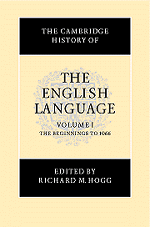6 - OLD ENGLISH DIALECTS
Published online by Cambridge University Press: 28 March 2008
Summary
Introduction
Dialectology is the study of varieties of speech and variation in language. Dialectologists work to make correlations between linguistic features (phonological, morphological, syntactic and lexical) and such extralinguistic facts as place of origin, race, sex, social status. In doing so, we identify individual varieties – idiolects – and relate them to dialects, the more general patterns of speech communities. When undertaking the study of a contemporary speech community, the dialectologist has living informants and modern devices for collecting data. Studies of historical varieties depend on less direct methods. The main sources of information are written records and conjectures about older varieties based on comparisons of surviving dialects. Linguists interested in earlier varieties of English are fortunate that the English language has been written for over a thousand years. Those records attest several clearly distinct historical varieties, compare the Old English of Beowulf with Chaucer's Middle English or Shakespeare's Early Modern English. More subtle distinctions within periods, as between Chaucer and the Pearl/Gawain, are also evident. This chapter will be an investigation of the modern methods used to extract as much information as possible from ancient written records.
Given its name and rather narrow focus, Old English dialectology might at first seem a subject very remote from day-to-day human affairs. Speakers of a language are, however, by their very nature unselfconscious ‘students’ of speech varieties. Early in life we begin that ‘training’ by identifying and learning to imitate the wide range of speech habits and styles we encounter in our nurturing environments.
- Type
- Chapter
- Information
- The Cambridge History of the English Language , pp. 409 - 451Publisher: Cambridge University PressPrint publication year: 1992
- 57
- Cited by



